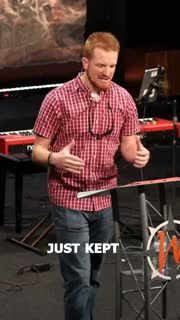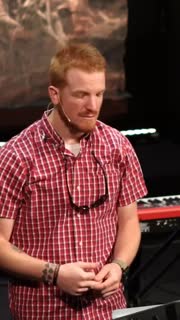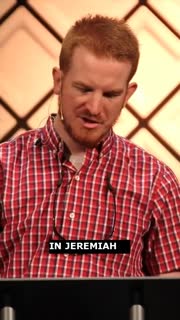Embracing the New Covenant: Jesus and Transformation
Devotional
Sermon Summary
Bible Study Guide
Sermon Clips
### Quotes for Outreach
1. "I just kept coming back to this idea that I just needed to simply share the gospel simply share the gospel but not in like a gospel track not in like an ABC's of becoming a Christian kind of way but in more of like a the whole Bible points to the truth of the gospel the gospel does not exist only in the four gospels of Matthew, Mark, Luke and John but the whole Bible points to the gospel and connecting the dots of how that all works together that kind of way of presenting the gospel." [21:02] (36 seconds)
2. "The irony of the followers of John and the Pharisees fasting was that fasting ties back to the day of atonement remember here in front of them stands the one who will complete God's plan for atonement here stands the one that the whole old testament has pointed to here stands the one that is the whole reason we fast is for this moment of atonement and their fasting Jesus stands before them at the point of so let me tile this all together for you." [59:32] (40 seconds)
3. "The old covenant was about what you could do to save yourself and the new covenant was about you can't save yourself I'll do it for you and Christ came and paid a debt you couldn't pay in the same way that I can go and swing a bat at a 99 mile an hour fastball all I want I'll never hit it but he came and atoned for your sin that you were incapable of atoning for by his blood." [01:09:35] (29 seconds)
4. "Jesus isn't asking you to follow warm and fuzzies he's asking you to follow him and you want to talk about freedom you want to talk about freedom he's freed you from the chains of sin and death ever and Ephesians 2 8 9 says for by grace you have been saved through faith sound familiar you see this thread that just goes through all of it you've been saved by faith and this is not your own doing it's the gift of God not a result of work so that no one may boast Jesus is calling you to repent believe and follow him." [01:11:05] (46 seconds)
5. "We always say we want to tell people Jesus loves you we want to tell people Jesus loves you well he does but he didn't just walk around saying I love you all the time he walked around saying repent and believe turn from your sin and your wicked ways and follow me Mark chapter 1 verse 15 from Jesus himself the time is fulfilled and the kingdom of God is at hand repent and believe in the gospel that's what he called us to do yes he loves you but if that's all you're focused on you're missing it you're fasting in the face of the groom and it's foolishness." [01:11:51] (39 seconds)
### Quotes for Members
1. "The purpose of the covenant was not to see if man could accomplish this some of you probably already got there in your head the purpose of the covenant was not to see if man could pull it off God already knew man couldn't be holy we have a sin nature we have a fallen nature because of what happened in the Garden of Eden God already knew that the purpose of the covenant was to set them apart and to give man a means to return to his presence it was about man's faithfulness to God and not the works themselves yes it is works based but God never intended for man to be so focused on the works that they missed out on the whole reason to be holy in the first place was to live in relationship with him." [44:10] (48 seconds)
2. "God didn't make a mistake when he created the old covenant he didn't accidentally leave a missing piece he didn't forget to add a fail safe for the dummies that would eventually use it and screw it up that's not what happened it wasn't that he didn't know that man couldn't keep the law but instead through the law we are we begin to understand our own our sinfulness the law reveals to us just how unholy we are because God said here's what it takes to be holy and then we look at it and go rut row big problem he didn't forget that or miss that." [47:59] (52 seconds)
3. "The new covenant isn't something that's a patch that we just kinda add on the bottom of the old covenant so that we can keep doing those things and say that we're awesome that's not the point and the old covenant isn't something that we just take off and throw away either cause it's missing a spot because the old covenant and the new covenant like all covenants of God come together to make this beautiful picture where we truly can see the depth of his majesty the new covenant is a new garment all together that covers the entire entirety of the old covenant it doesn't just fix a little hole it covers the entirety of it the new covenant in and of itself is a fulfillment but it's also a fulfillment of the old covenant." [50:02] (47 seconds)
4. "God is seeking faith and faithfulness from his people that's number one and number two we see that when man sins it's blood that covers that sin often times a bloody mess I was I was talking through this with one of my really close friends and mentors this week we just were catching up on the phone and we were just kind of talking through what I was going to teach on and stuff and this isn't in the text I can't prove this to you but we were talking about if you think about the blood that's got to be drained these priests were probably like knee deep in blood all the time from all of the blood that had to be spilt for our sin there was so much blood and sacrifice we look at the old testament is a bloody collection of books but that's not for no reason God is seeking faith and faithfulness from his people and when man sins it is blood that covers that sin." [58:26] (65 seconds)
5. "In Jeremiah chapter 31 and I'm going to read these two chunks of verses to you even though I know I've worn you out this morning but in Jeremiah 31 verses 31 through 33 God declares behold the days are coming declares the Lord when I will make a new covenant with the house of Israel and the house of Judah not like the covenant that I made with their fathers on the day when I took them by the hand to bring them out of the land of Egypt my covenant that they broke though I was their husband sound familiar declares the Lord for this is the covenant that I will make with the house of Israel after those days declares the Lord I will put my law within them and I will write it on their hearts and I will be their God and they shall be my people." [01:03:47] (44 seconds)
Ask a question about this sermon
1. "I just kept coming back to this idea that I just needed to simply share the gospel simply share the gospel but not in like a gospel track not in like an ABC's of becoming a Christian kind of way but in more of like a the whole Bible points to the truth of the gospel the gospel does not exist only in the four gospels of Matthew, Mark, Luke and John but the whole Bible points to the gospel and connecting the dots of how that all works together that kind of way of presenting the gospel." [21:02] (36 seconds)
2. "The irony of the followers of John and the Pharisees fasting was that fasting ties back to the day of atonement remember here in front of them stands the one who will complete God's plan for atonement here stands the one that the whole old testament has pointed to here stands the one that is the whole reason we fast is for this moment of atonement and their fasting Jesus stands before them at the point of so let me tile this all together for you." [59:32] (40 seconds)
3. "The old covenant was about what you could do to save yourself and the new covenant was about you can't save yourself I'll do it for you and Christ came and paid a debt you couldn't pay in the same way that I can go and swing a bat at a 99 mile an hour fastball all I want I'll never hit it but he came and atoned for your sin that you were incapable of atoning for by his blood." [01:09:35] (29 seconds)
4. "Jesus isn't asking you to follow warm and fuzzies he's asking you to follow him and you want to talk about freedom you want to talk about freedom he's freed you from the chains of sin and death ever and Ephesians 2 8 9 says for by grace you have been saved through faith sound familiar you see this thread that just goes through all of it you've been saved by faith and this is not your own doing it's the gift of God not a result of work so that no one may boast Jesus is calling you to repent believe and follow him." [01:11:05] (46 seconds)
5. "We always say we want to tell people Jesus loves you we want to tell people Jesus loves you well he does but he didn't just walk around saying I love you all the time he walked around saying repent and believe turn from your sin and your wicked ways and follow me Mark chapter 1 verse 15 from Jesus himself the time is fulfilled and the kingdom of God is at hand repent and believe in the gospel that's what he called us to do yes he loves you but if that's all you're focused on you're missing it you're fasting in the face of the groom and it's foolishness." [01:11:51] (39 seconds)
### Quotes for Members
1. "The purpose of the covenant was not to see if man could accomplish this some of you probably already got there in your head the purpose of the covenant was not to see if man could pull it off God already knew man couldn't be holy we have a sin nature we have a fallen nature because of what happened in the Garden of Eden God already knew that the purpose of the covenant was to set them apart and to give man a means to return to his presence it was about man's faithfulness to God and not the works themselves yes it is works based but God never intended for man to be so focused on the works that they missed out on the whole reason to be holy in the first place was to live in relationship with him." [44:10] (48 seconds)
2. "God didn't make a mistake when he created the old covenant he didn't accidentally leave a missing piece he didn't forget to add a fail safe for the dummies that would eventually use it and screw it up that's not what happened it wasn't that he didn't know that man couldn't keep the law but instead through the law we are we begin to understand our own our sinfulness the law reveals to us just how unholy we are because God said here's what it takes to be holy and then we look at it and go rut row big problem he didn't forget that or miss that." [47:59] (52 seconds)
3. "The new covenant isn't something that's a patch that we just kinda add on the bottom of the old covenant so that we can keep doing those things and say that we're awesome that's not the point and the old covenant isn't something that we just take off and throw away either cause it's missing a spot because the old covenant and the new covenant like all covenants of God come together to make this beautiful picture where we truly can see the depth of his majesty the new covenant is a new garment all together that covers the entire entirety of the old covenant it doesn't just fix a little hole it covers the entirety of it the new covenant in and of itself is a fulfillment but it's also a fulfillment of the old covenant." [50:02] (47 seconds)
4. "God is seeking faith and faithfulness from his people that's number one and number two we see that when man sins it's blood that covers that sin often times a bloody mess I was I was talking through this with one of my really close friends and mentors this week we just were catching up on the phone and we were just kind of talking through what I was going to teach on and stuff and this isn't in the text I can't prove this to you but we were talking about if you think about the blood that's got to be drained these priests were probably like knee deep in blood all the time from all of the blood that had to be spilt for our sin there was so much blood and sacrifice we look at the old testament is a bloody collection of books but that's not for no reason God is seeking faith and faithfulness from his people and when man sins it is blood that covers that sin." [58:26] (65 seconds)
5. "In Jeremiah chapter 31 and I'm going to read these two chunks of verses to you even though I know I've worn you out this morning but in Jeremiah 31 verses 31 through 33 God declares behold the days are coming declares the Lord when I will make a new covenant with the house of Israel and the house of Judah not like the covenant that I made with their fathers on the day when I took them by the hand to bring them out of the land of Egypt my covenant that they broke though I was their husband sound familiar declares the Lord for this is the covenant that I will make with the house of Israel after those days declares the Lord I will put my law within them and I will write it on their hearts and I will be their God and they shall be my people." [01:03:47] (44 seconds)










